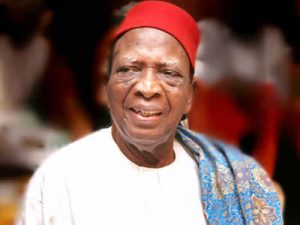It could almost be predicted that such a squaring up would come. Professor Ben Nwabueze had made the claim one more time too many and someone was bound to ask for the evidence of Islamisation of Nigeria. The Sultan turned up to be the one to ask for the evidence. Speaking in Kaduna Monday this week, the second time within a month or so, the Sultan expressed worry that elder statesmen make what he regards as provocative statements about the Buhari government pursuing an Islamisation agenda. He demanded that people should stop making the claim about Islamisation and herdsmen being used to islamise the country.


Prof Ben Nwabueze

Religious leaders
It was an understandable fury. Professor Nwabueze has made this claim very early in the life of the administration. And he made it again last week. It is normal that someone asks for the evidence. The problem, however, is that nobody is going to provide the evidence. The Sultan would most likely get no evidence. But he would only be getting ‘evidence’. In other words, such claims are products of interpretations rather than the kind of evidence being sought. And interpretations are products of where the interpreter stands. Some interpreters are genuinely ignorant, others are out for mischief while some more others are clearly on an agenda of manipulation of fault lines for whatever gains, probably power. Whether a member of the elite should manipulate differences deliberately for power is a different moral question but the elite in Nigeria do it.
Sociologically, it could be dismissed as nonsensical to talk of Islamisation or Christianization of Nigeria. This is because theocracy can only work in a rural society. Nigeria is a largely agrarian society but it is not rural. It has experienced urbanization, it is very complex now and there has been considerable integration across class, religion, regions, ideologies and culture or groups. Islamizing or Christianizing Nigeria in this complexity looks out rightly a futile project. But people still allege plans to Islamise the country. Such allegations can, therefore, only be understood from the cognitive frame of reference of those making them. It is only by inter-subjective engagement that their evidence can either be appreciated, interrogated or dismissed.
What that means is that the Sultan and other religious leaders in Nigeria have more works to do in terms of the kind of inter-subjective engagements that are still not taking place in the country. The elite are talking a lot, holding numerous seminars and pretending to be engaging the problems. A lot of this goes on in Kaduna, Lagos, Abuja, the universities and other centres created for such healthy speculations. It is possible that without this much, the country might be worse off today. However, it might be important if the elite operationalise more symbolic actions.
In 2010, shortly before Umaru Yar’Adua died, there was a symbolic action. All the governors of Nigeria except two or so converged in Bayelsa State. It was a largely symbolic activity which, however, sent a message that must have contributed in consolidating the Amnesty programme. There was certainly something in the friendship of the late Emir of Kano and the Ooni of Ife. The two have travelled on the journey of no return and we have not found a new pair in that class. In nation building, some people would argue that such little, symbolic actions send more enduring messages than the ones that statesmen would consider the great actions.
Nowadays, the politicians are not mobilising the citizenry. They are not doing that within the context of the parties in existence nor are they doing it on any grand scale. So, the little mobilisation that takes place is mostly on divisive issues. It is even surprising that the country is not more conflicted than it is, given the mobilisation of enmity that has taken place over the years.
It is the gradual reversal of this long history of mobilisation of differences that the Sultan and other traditional and religious leaders have their role cut for them. Luckily, they have all the ingredients which power the world today more than ballistic missiles do. Such include language use, ideas, religion, culture and norms. And they should use that power now to broaden inter-subjective conversations that break down barriers and enhance mutually beneficial interactions across those barriers. This is important and urgent before the country gives room for those who might be tempted to think that there is no alternative to a fight to finish. Conflicts along the religious divide have already stressed Nigeria up. An alternative future is possible.




























